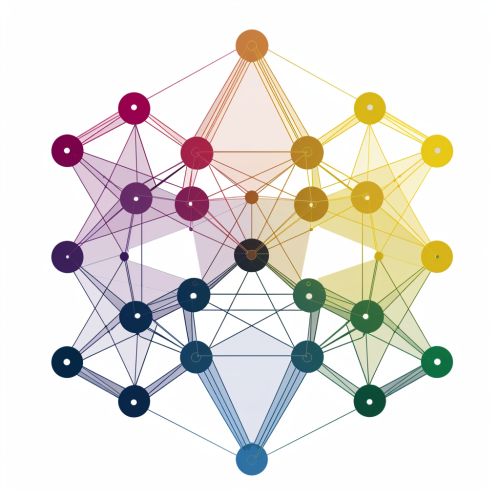Legendre polynomials
Introduction
Legendre polynomials are a sequence of orthogonal polynomials that arise in the context of solving certain types of differential equations, particularly in physics and engineering. Named after the French mathematician Adrien-Marie Legendre, these polynomials are solutions to Legendre's differential equation and are widely used in problems involving spherical coordinates, such as in potential theory and quantum mechanics.
Definition and Properties
Legendre polynomials \( P_n(x) \) are defined as solutions to Legendre's differential equation:
\[ (1 - x^2) \frac{d^2 P_n(x)}{dx^2} - 2x \frac{dP_n(x)}{dx} + n(n+1)P_n(x) = 0 \]
where \( n \) is a non-negative integer. These polynomials can also be generated using the Rodrigues' formula:
\[ P_n(x) = \frac{1}{2^n n!} \frac{d^n}{dx^n} \left( x^2 - 1 \right)^n \]
Legendre polynomials are orthogonal with respect to the weight function \( w(x) = 1 \) on the interval \([-1, 1]\):
\[ \int_{-1}^{1} P_m(x) P_n(x) \, dx = \frac{2}{2n + 1} \delta_{mn} \]
where \( \delta_{mn} \) is the Kronecker delta, which is 1 if \( m = n \) and 0 otherwise.
Recurrence Relations
Legendre polynomials satisfy several recurrence relations, which are useful for computational purposes. The three-term recurrence relation is given by:
\[ (n+1) P_{n+1}(x) = (2n+1)x P_n(x) - n P_{n-1}(x) \]
This relation allows for the efficient computation of higher-order polynomials from lower-order ones.
Generating Function
The generating function for Legendre polynomials is an essential tool in their study and application. It is given by:
\[ \frac{1}{\sqrt{1 - 2xt + t^2}} = \sum_{n=0}^{\infty} P_n(x) t^n \]
This function can be used to derive various properties and relations of the polynomials.
Orthogonality and Normalization
The orthogonality of Legendre polynomials is a critical property that makes them useful in various applications, such as in the expansion of functions in series of orthogonal polynomials. The normalization condition is:
\[ \int_{-1}^{1} P_n(x)^2 \, dx = \frac{2}{2n + 1} \]
This ensures that the polynomials are orthonormal when scaled appropriately.
Applications
Legendre polynomials have numerous applications in physics and engineering. Some of the most notable include:
Potential Theory
In potential theory, Legendre polynomials are used to solve Laplace's equation in spherical coordinates. They appear in the expansion of the gravitational and electrostatic potentials.
Quantum Mechanics
In quantum mechanics, Legendre polynomials arise in the solution of the Schrödinger equation for the hydrogen atom. They are used in the angular part of the wavefunctions, known as spherical harmonics.
Numerical Analysis
In numerical analysis, Legendre polynomials are employed in Gaussian quadrature, a method for approximating the definite integral of a function. The roots of the Legendre polynomials are used as the quadrature points.


Special Cases and Related Functions
Legendre polynomials are a special case of the more general class of orthogonal polynomials. Some related functions include:
Associated Legendre Functions
Associated Legendre functions \( P_n^m(x) \) are generalizations of Legendre polynomials that include an additional parameter \( m \). They are solutions to the associated Legendre differential equation:
\[ (1 - x^2) \frac{d^2 P_n^m(x)}{dx^2} - 2x \frac{dP_n^m(x)}{dx} + \left[ n(n+1) - \frac{m^2}{1 - x^2} \right] P_n^m(x) = 0 \]
These functions are used in the study of spherical harmonics and in solving partial differential equations in spherical coordinates.
Spherical Harmonics
Spherical harmonics \( Y_{lm}(\theta, \phi) \) are functions on the sphere that are expressed in terms of associated Legendre functions. They are used in various fields, including quantum mechanics, geophysics, and computer graphics.
Computational Methods
The computation of Legendre polynomials can be performed using various methods, including:
Direct Evaluation
Using the Rodrigues' formula, Legendre polynomials can be directly evaluated for small values of \( n \).
Recurrence Relations
For larger values of \( n \), recurrence relations provide a more efficient method for computing Legendre polynomials.
Numerical Libraries
Several numerical libraries, such as those in MATLAB, NumPy, and SciPy, provide built-in functions for computing Legendre polynomials and their associated functions.
Historical Context
Adrien-Marie Legendre first introduced these polynomials in the late 18th century. His work laid the foundation for many subsequent developments in mathematical physics and numerical analysis. The polynomials have since been named in his honor and continue to play a crucial role in various scientific and engineering disciplines.
